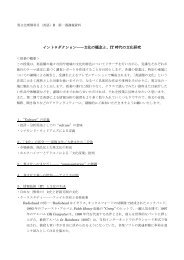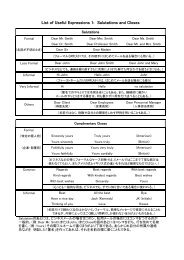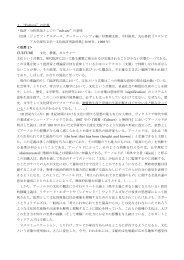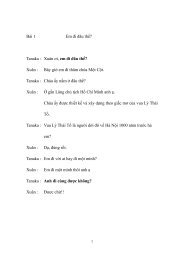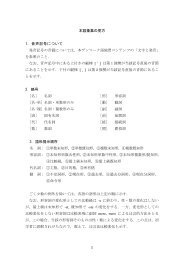4 - 大阪大学世界言語eラーニングサーバ
4 - 大阪大学世界言語eラーニングサーバ
4 - 大阪大学世界言語eラーニングサーバ
You also want an ePaper? Increase the reach of your titles
YUMPU automatically turns print PDFs into web optimized ePapers that Google loves.
unresolved, plagued by issues of tradition and prestige. Finally, in 1863, a group of former public<br />
schoolboys met in London to hammer out a common code. The two principal difficulties arose from<br />
the dispute between those who favoured a kicking/dribbling game and those preferring a<br />
catching/running one, and between those who favoured “hacking” and those who wanted to ban such<br />
physical contact. Finally, and after compromise with a near-simultaneous codification effort based in<br />
Sheffield, the Association Football rules weren’t simply agreed on paper, but on the mud and turf of<br />
the nation’s pitches. In 1871, the aficionados of handling set up their own Rugby Football Union.<br />
I. “Clubbishness” Characterizes the British Culture<br />
Most societies in the world used bows and arrows, yet Brits were the first to set up archery clubs and<br />
tournaments for fun. Though countless people have ridden horses, it took Brits to think that clubs<br />
and rules were essential. In sailing and rowing too, the same thing happened. All the oldest sports<br />
clubs in the world are British: the Southampton Town Bowling Club (1299), the Society of Kilwinning<br />
Archers (1483), the Guild of the Fraternity of St George (1537), the Kilsyth Curling Club (1716), the<br />
Royal Cork Yacht Club (1720), and the Edinburgh Skating Club and the Honourable Society of<br />
Edinburgh Golfers (both 1744). As soon as you have clubs, you need rules: what’s permitted; what’s<br />
not permitted; how should competitions be organized; who can our club compete against That<br />
habit of clubbishness is the clue, the reason why the pastimes of others became sports of ours.<br />
So why were we so very clubbable The answer must surely lie in how very organized the country<br />
was. From Anglo-Saxon times on, the country was ordered, from national parliament down to local<br />
parish or manor. Members of Parliament were appointed or elected; laws were made, were locally<br />
applied, were enforced through the courts. Nowhere else was society as minutely ordered; nowhere<br />
else was that order so little disrupted by war, conquest or revolution. Nowhere else was physical<br />
roughhousing less likely to spill over into serious crime.<br />
And perhaps that’s the secret: British love of rough-and-tumble games plus British clubbishness<br />
equals the British creation of sport. If so, it would be tempting to do as most historians have done,<br />
and relegate the whole story of sport to little more than a colourful footnote to the main story of<br />
Britain. Tempting, but wrong. Clubbishness matters. It’s the insight of Robert Putnam, an American<br />
social scientist, whose book Bowling Alone traced the vast amount of social capital stored in a<br />
nation’s clubs and associations. That social capital manifests itself as economic success, better health,<br />
social cohesiveness—all the good things a society seeks. If Britain was vastly more associative as a<br />
nation than others, then it almost certainly had way more social capital too. That’s no mere footnote;<br />
that’s an observation that goes to the heart of what has made Britain distinctive, what has shaped<br />
British national success.



